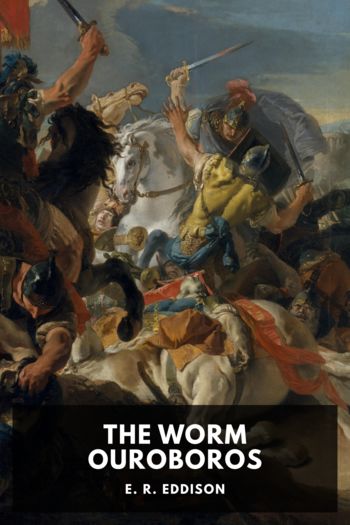The Cream of the Jest by James Branch Cabell (the first e reader TXT) 📕

- Author: James Branch Cabell
Book online «The Cream of the Jest by James Branch Cabell (the first e reader TXT) 📕». Author James Branch Cabell
To live was to be through his senses conscious, one by one, of a restricted number of these fractions of a second. Success in life, then, had nothing to do with bank-accounts or public office, or any step toward increasing the length of one’s obituary notices, but meant to be engrossed utterly by as many as possible of these instants. And complete success required a finding, in these absorbing instants, of employment for every faculty he possessed. It was for this that Kennaston had always vaguely longed; and to this, if only in dreams, he now attained.
If only in dreams he debated: why, and was he not conscious, now, in his dreams, of every moment as it fled? And corporal life in banks and ballrooms and legislative halls and palaces, nowhere had anything more than that to offer mortal men.
It is not necessary to defend his course of reasoning; to the contrary, its fallacy is no less apparent than its conduciveness to unbusinesslike conclusions. But it is highly necessary to tell you that, according to Felix Kennaston’s account, now, turn by turn, he was in Horvendile’s person rapt by nearly every passion, every emotion, the human race has ever known. True, throughout these dramas into which chance plunged him, in that he knew always he was dreaming, he was at once performer and spectator; but he played with the born actor’s zest—feeling his part, as people say—and permitting the passion he portrayed to possess him almost completely.
Almost completely, be it repeated; for there was invariably a sufficient sense of knowing he was only dreaming to prevent entire abandonment to the raw emotion. Kennaston preferred it thus. He preferred in this more comely way to play with human passions, rather than, as seemed the vulgar use, to consent to become their battered plaything.
It pleased him, too, to be able to have done with such sensations and emotions as did not interest him; for he had merely to touch Ettarre, and the dream ended. In this fashion he would very often terminate an existence which was becoming distasteful—resorting debonairly to this sort of suicide, and thus dismissing an era’s social orderings and its great people as toys that, played with, had failed to amuse Felix Kennaston.
Book Fourth“But there were dreams to sell
Ill didst thou buy:
Life is a dream, they tell,
Waking to die.
Dreaming a dream to prize,
Is wishing ghosts to rise;
And, if I had the spell
To call the buried—well,
Which one would I?”
As has been said, Kennaston read much curious matter in his dead uncle’s library. …
But most books—even Felix Kennaston’s own little books—did not seem now to be affairs of heavy moment. Once abed, clasping his gleaming broken bit of metal, and the truthful history of all that had ever happened was, instead, Kennaston’s library. It was not his to choose from what volume or on which page thereof he would read; accident, as it seemed, decided that; but the chance-opened page lay unblurred before him, and he saw it with a clarity denied to other men of his generation.
Kennaston stood by the couch of Tiberius Caesar as he lay ill at Capreæ. Beside him hung a memorable painting, by Parrhasius, which represented the virgin Atalanta in the act of according very curious assuagements to her lover’s ardor. Charicles, a Greek physician, was telling the Emperor of a new religious sect that had arisen in Judea, and of the persecutions these disciples of Christus were enduring. Old Caesar listened, made grave clucking noises of disapproval.
“It is, instead, a religion that should be fostered. The man preached peace. It is what my father before me strove for, what I have striven for, what my successors must strive for. Peace alone may preserve Rome: the empire is too large, a bubble blown so big and tenuous that the first shock will disrupt it in suds. Pilate did well to crucify the man, else we could not have made a God of him; but the persecution of these followers of Christus must cease. This Nazarene preached the same doctrine that I have always preached. I shall build him a temple. The rumors concerning him lack novelty, it is true: this God born of a mortal woman is the old legend of Dionysos and Mithra and Hercules, a little pulled about; Gautama also was tempted in a wilderness; Prometheus served long ago as man’s scapegoat under divine anger; and the cult of Pollux and Castor, and of Adonis, has made these resurrection stories hackneyed. In fine, Charicles, you have brought me a woefully inartistic jumble of old tales; but the populace prefers old tales, they delight to be told what they have heard already. I shall certainly build Christus a temple.”
So he ran on, devising the reception of Christ into the Roman pantheon, as a minor deity at first, and thence, if the receipts at his temple justified it, to be raised to greater eminence. Tiberius saw large possibilities in the worship of this new God, both from a doctrinal and a moneymaking standpoint. Then Caesar yawned, and ordered that a company of his Spintriæ be summoned to his chamber, to amuse him with their unnatural diversions.
But Charicles had listened in horror, for he was secretly a Christian, and knew that the blood of the martyrs is the seed of the church. He foresaw that, without salutary discouragement, the worship of Christus would never amount to more than the social fad of a particular season, just as that of Cybele and that of Heliogabalus had been modish in different years; and would afterward dwindle, precisely as these cults had done, into shrugged-at old-fashionedness. Then, was





Comments (0)